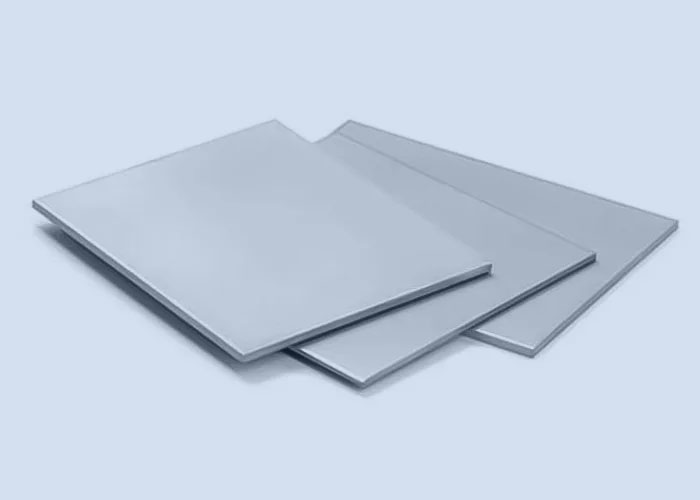Titanium Plate
Titanium Plate
Our Titanium sheets and plates are lightweight, high-strength materials engineered for superior corrosion resistance, durability, and performance under extreme conditions. Manufactured to meet the highest international standards, our titanium products are widely used in aerospace, medical, chemical, marine, and industrial applications where strength-to-weight ratio and longevity are critical.
As a leading titanium sheet and plate supplier in China, we produce both commercially pure titanium and titanium alloy plates by combining titanium with elements such as aluminum and vanadium to enhance strength, ductility, and thermal stability. These sheets significantly outperform conventional metals like steel in aggressive environments, offering unmatched reliability and low weight.
Titanium Plate Grades
Titanium Plates Specifications
- Standards Complied: ASTM B265 / ASME SB265, ASTM B381
- Available Grades: Gr.1, Gr.2, Gr.3, Gr.5 (Ti-6Al-4V), Gr.7, Gr.9, Gr.12
- Sheet Width: Up to 2000mm
- Sheet Length: Up to 5000mm
- Precision Cutting: Waterjet cutting to custom sizes, oxide-free and burr-free
Whether you’re sourcing titanium sheets for aerospace components or titanium alloy plates for medical implants, we provide tailored solutions with fast lead times and strict quality control.
Why Choose Us?
- Advanced production facilities and in-house cutting services
- ISO-certified quality assurance and full traceability
- Expert support for material selection and custom orders
- Competitive pricing direct from factory
Request a quote today for your titanium sheet or plate needs—we deliver quality you can trust.
Different Titanium Plates Applications & Useage
Titanium sheets are widely used in petrochemical machinery manufacturing due to their excellent corrosion resistance, lightweight properties, and superior strength-to-weight ratio. In this sector, titanium is commonly used to fabricate a variety of critical components such as:
- Pressure vessels and storage containers
- Chemical reactors and heat exchangers
- Distillation columns and pipelines
- Pumps, valves, and condensers
- Cathodes in electrolytic systems
- Environmental control equipment in pollution management
Although titanium plates are softer than steel in terms of hardness, titanium alloys offer significantly higher specific strength (tensile strength per unit weight), making them a top choice where high strength and low weight are essential.
Thanks to their excellent heat resistance, low-temperature toughness, and high fracture toughness, titanium alloys are heavily utilized in the aerospace and defense industries, including:
- Aircraft engine components
- Rocket and missile structural parts
- High-pressure vessels and fuel tanks
- Oxidizer tanks for space systems
- Tubes for recoilless guns
- Parts for automatic rifles and mortar base plates
With such a unique combination of mechanical and corrosion-resistant properties, titanium sheets and plates play a critical role in modern industrial and military applications where performance and reliability are non-negotiable.
Titanium Plates: The Ultimate Guide
The titanium alloy sheet is a thin flat stock metal that exhibits uniform thickness and are formed from strips and coils of titanium.
So what’s the grade? What’s the production process of these sheets?
In this guide, we will show you details about all.
How Titanium Plates Are Made?
1. Alloy Melting and Casting
Raw materials, including pure nickel and other alloying elements such as chromium, molybdenum, iron, or copper, are melted in a vacuum induction furnace or electric arc furnace. The molten alloy is then cast into ingots or slabs.
2. Hot Rolling
The cast ingot is reheated and passed through a series of rollers at high temperatures (typically above 1000°C) to reduce its thickness and improve its grain structure. This process forms a hot-rolled nickel alloy coil or plate.
3. Pickling and Surface Cleaning
After hot rolling, the material is typically pickled using acid to remove surface scale, oxides, and impurities, resulting in a cleaner surface for further processing.
4. Cold Rolling
The hot-rolled sheet is further processed through cold rolling, where it’s passed through rollers at room temperature. This step refines the surface finish, enhances dimensional accuracy, and increases strength through strain hardening. It also reduces the thickness to the final range—usually between 0.5 mm and 5 mm.
5. Annealing (Heat Treatment)
To relieve internal stresses from cold rolling and restore ductility, the sheets are heat-treated in a controlled atmosphere. This step improves formability and prepares the sheet for cutting or shaping.
6. Surface Finishing
The sheet surface is further treated to achieve a bright, smooth, and defect-free finish. Common methods include polishing, brushing, or bright annealing depending on the desired surface quality.
7. Cutting and Shearing
The sheets are then cut into custom sizes using shearing or laser cutting machines. Dimensional tolerances are carefully controlled based on customer requirements.
8. Inspection and Quality Control
Every batch of nickel alloy sheet undergoes strict quality inspection, including checks for thickness, flatness, mechanical properties, surface quality, and chemical composition.
9. Packaging and Delivery
Finally, the finished nickel alloy sheets are carefully packaged—often with interleaving paper or plastic film—and shipped to customers worldwide.
What Is The Packaging Standard of Titanium Plate?
- Standard export sea packaging:
Waterproof Paper Winding+PVC Film+Strap Banding+Wooden Pallet or Wooden Case; - Customized packaging as your request (Logo or other contents accepted to be printed on the packaging);
- Other special packaging will be designed as customer’s request;
Eye to wall and eye to sky are both available; - By International Express: DHL/UPS/FEDEX/EMS and our own express line;
- By air or By sea;
- Shipping port: Shanghai, Ningbo or as your request.












